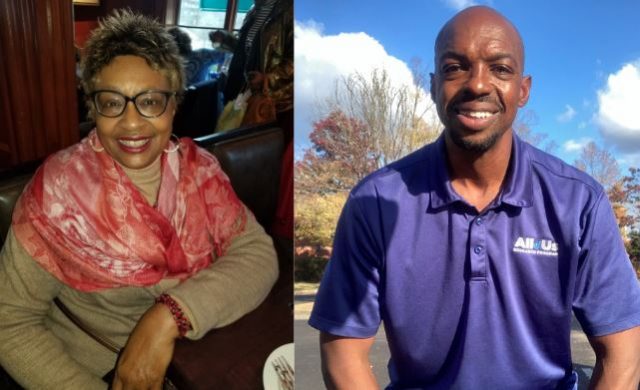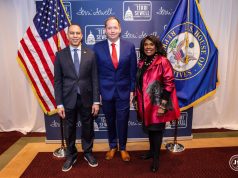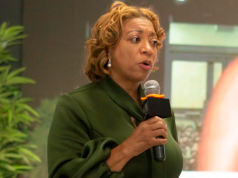Solomon Crenshaw Jr.
For The Birmingham Times
The goal of the All of Us Research Program is to help researchers understand more about why people get sick or stay healthy. People who join give information about their health, habits and what it’s like where they live. By looking for patterns, researchers may learn more about what affects people’s health.
Angela Williams and Chris Crawford are research study navigators. That job entails making sure that various communities are aware of the study, informing communities and potential participants about the components of the study and what it entails so that they can make an informed decision to participate.
Here, Williams and Crawford discuss the program.
In a few words, can you explain what the All of Us Research Program is?
Williams: The All of Us Research Program is a large research study. It is a national study with a goal to invite a million diverse people to help researchers understand more about why some people get sick, and why some people are overall in great health.
What does precision medicine mean to you?
Crawford: Precision medicine means having precise medicine for individuals and treatments. For myself, I’m 6-4, 230 pounds. My body, size, and weight are different from a lot of people. The same medicine that works for them (isn’t guaranteed to) work for me. Precision medicine will have medicine precisely for individuals — their height, weight, gender, age, race and everything.
What made you decide to join the All of Us Research Program as a team member?
Crawford: Actually, I started by just interviewing for a position. Then when I found out about it, I was kind of excited about working with the All of Us Research Program. I think it’ll be beneficial to us in the long run. It’s beneficial to all Americans, but actually beneficial to the African American race because a lot of research and a lot of medicines that we are taking advantage of today, we (African Americans) weren’t part of research (for those medicines) back then. As this goes forward and we get a big, diverse group of people, it will help as far as making medicine and treatment that will be more precise for us and help us in the future.
Why are you motivated to propel All of Us forward?
Williams: I am highly motivated as a community health advisor, seeing that there are health disparities in our communities that disproportionately affect African Americans, and again, Hispanics, rural Americans as well, and people with disabilities. Any study that is making an effort to invest resources to ensure that all of us have an opportunity to participate, then that’s very motivating for me. My parents died one week apart from two different types of cancers in 1991. Then in 2001, I lost my oldest sister to a third cancer. I am highly motivated from a lot of different perspectives, not only based on my role at UAB currently and based on my community environment, but like a lot of us, I have family history. I am an advocate for participation in research studies that give us an opportunity to participate in the beginning and share our information that may provide our future generations with a better outcome when it comes to drugs, treatments, and prevention.
Crawford: My motivation comes from just seeing a lot of people that are not being treated correctly for their illnesses. I feel that if this program is what it says it will be, it will help a lot of people out with that, especially like high blood pressure and illnesses like that, or even help to avoid being diagnosed late with something. It will have the precision medicines and the tools needed to help these people, as far as getting healed sooner, quicker.
How did you hear about the All of Us program?
Williams: I am presently a staff member in the Division of Preventive Medicine so I am afforded the opportunity to hear about, work on, and participate in leading edge research programs like All of Us.
Who would you encourage to enroll in All of Us?
Crawford: I would encourage everyone that’s 19 years of age and older. I would encourage them because we need a database of different people to have the results that we need to be able to diagnose and treat these different illnesses correctly. You can’t just have one group of people and think it’s going to affect the whole population. Everybody has different DNA and different genes. We all are made up differently. Some people may look the same on the outside, but we all are different.
What would you say to someone who’s hesitant about signing up for the All of Us Research Program?
Crawford: I would tell them this: A lot of the medicine and treatments that we’re taking advantage of today, they were researched and studied on people in the past. If you’re hesitant, think about participating for future generations to have precise medicine or the treatment and the medicines that they need to help them in the future.
Williams: I always approach any concerns or hesitancy that a potential participant might have from a perspective of respect because I want them to make an informed decision. I want them to have their questions answered prior to participating in research studies. I make myself available if they have questions. I will be glad to try to answer their questions if they have questions or concerns. If there’s someone else that I can refer them to, to answer their questions, I will do that, like someone in management on the AoU team. And for those who are comfortable with online resources, I highly encourage them to do the research, to go to the JoinAllofUs.org/UAB website and look up information and take their time. I let them know how to get back in contact with me should they choose they’re willing to participate.
What do you see as one of the most important benefits coming from the All of Us Research Program?
Crawford: I think one of the most important benefits is going to be quicker treatments to different diseases and illnesses that are going on. We won’t have as many experimental, you know, ‘Try this out. Try this out.’ We’ll know exactly what to treat, how to treat it, when to treat it. I think that’s going to be the main benefit for it all.
How can someone reach All of Us with questions?
Williams: We have a telephone number that you can call, and that number is (833) JOIN-UAB. And if you call that number, someone will call you back from our team. You can always go to JoinAllofUs.org/UAB. There are a lot of information and resources available, and there may be frequently asked questions that are already listed that may address any questions or concerns that you might have.




